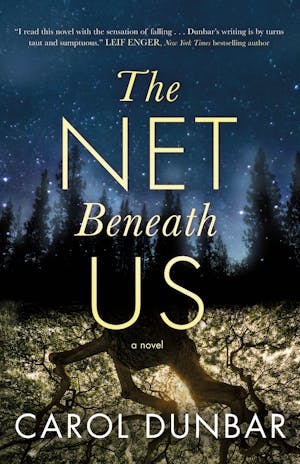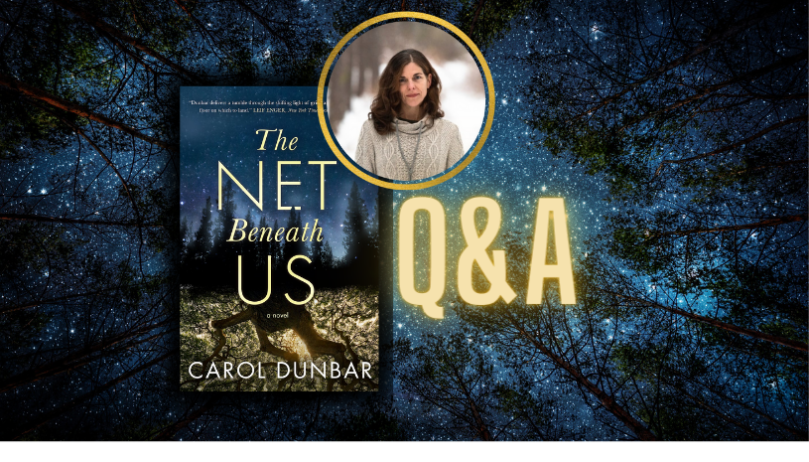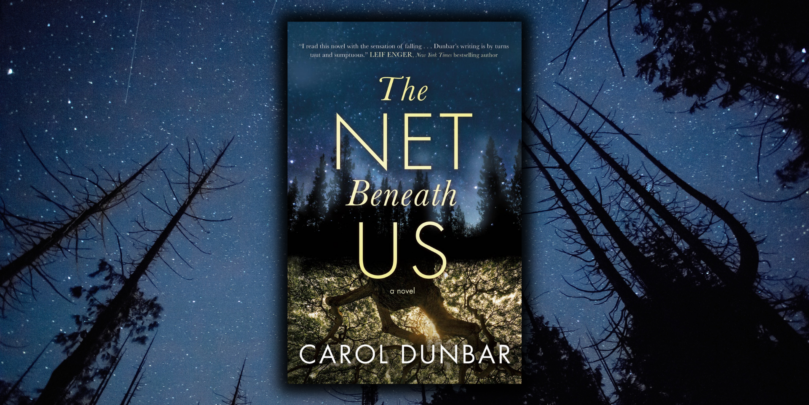 He promised her he would never let go. She’s willing to risk everything to hold on.
He promised her he would never let go. She’s willing to risk everything to hold on.
In the aftermath of her husband’s logging accident, Elsa has more questions than answers about how to carry on while caring for their two small children in the unfinished house he was building for them in the woods of rural Wisconsin. To cope with the challenges of winter and the near-daily miscommunications from her in-laws, she forges her own relationship with the land, learning from and taking comfort in the trees her husband had so loved. If she wants to stay in their home, she must discover her own capabilities, and accept help from the people and places she least expects.
In her debut novel, Carol Dunbar draws from her own lived experiences, vividly describing the wonder and harshness of life off the grid. Told over the course of a year, The Net Beneath Us is a lyrical exploration of loss, marriage, parenthood, and self-reliance; a tale of how the natural world—without and within us—offers us healing, if we can learn where to look.
Read below to see Carol’s answers to some burning questions!
I understand that you were an actor for many years, doing live theatre and commercial work. What made you decide to give that all that up and move off the grid?
It took me a long time to understand that I was a storyteller working in the wrong medium. When I did, it was difficult to walk away. Theatre will always be my first love, and like a relationship that you know is bad for you, but you just can’t end it, I had a hard time walking away. When my husband found an ad for an off-grid homestead in the forest, I said yes. Everyone who knew me was surprised. My husband grew up in the country and is a woodworker who always wanted to build furniture from his own trees. I wanted to become a writer although I didn’t know anything about living this way. We arrived wearing our bug spray and city shoes with a 15-month-old daughter and an aging dog. We had no idea what we were in for.
Living off the grid has come to mean a lot of things. What exactly does it mean for you?
That’s a good question—my husband and I are not hiding from the FBI! Off grid means not connected to the power lines. We are independent when it comes to our heat, water, and electricity. We heat our home using wood that we split ourselves and we pump water from a well. Now, our home and my office are 100-percent powered by the sun, but when we first moved here, we ran diesel engines to generator our electricity. These are huge engines once used to supply back-up power on trains, and they are the same engines that I describe in my first novel, The Net Beneath Us.
Let’s talk about your first novel. What’s it about and how did you get the idea?
The Net Beneath Us is about a young family building their house off the grid in the woods of rural Wisconsin when a logging accident alters the course of their lives. My main character, Elsa, is determined to carry on while carrying for their two small kids in the unfinished house her husband was building for them. This is a house with no running water or split firewood for heat, and winter is coming, but she’s motivated to stay because of her regrets. This is a story for anybody who has loved somebody and lost somebody. It’s about how to make your way back from a dark place by staying open to the wonders of the natural world.
The idea of an unfinished house came from a mysterious photo. It’s a picture of the house where I now live—but with a second story partially constructed. You can see the two-by-fours and the roof and there’s snow on the ground. But I live in this house, and we have no second story. So, I wondered, why someone would do that? Start building, get that far, and then take it down?
On your website, you also mention a real-life accident that served as a springboard for this novel. When did that happen?
The real-life accident happened four years after we moved here. Our furniture business was in full swing—my husband did the building, and I did the finish work. His table saw jumped back, and he had to take a year off to heal his hand. As difficult as that time was, one thing we were always aware of was that it could have been so much worse. We lost the income from our business, but I was able to get a temporary job in town. Our kids were ages two and five, it was fall, and I didn’t know how to split firewood. That was when I started writing this novel.
So, you followed the adage, “Write what you know?”
I did grab the low-hanging fruit of where I was at. A novel is, in many ways, a time capsule of life and place. I’m glad I wrote when my kids were young because you forget about things that you think you’ll always remember. But I didn’t really understand my main character until I flipped that adage around and wrote about what I didn’t know. Like me, my main character Elsa isn’t from the Midwest and didn’t grow up in the country. This novel took me more than ten years to write, so now, I’m very comfortable with living this way. But when I wrote from that place of not knowing, and showed the transformation, that’s when my story really took off.
How did you celebrate when you learned you were going to be a published author?
I live an hour away from a decent bottle of wine, so when my agent first started shopping around the manuscript, I bought a good bottle of champagne and tucked it in the back of the fridge. Because of the pandemic, that bottle sat in my fridge for a long time. My husband was like, “Um, can we open this?” And I was like, “No, that’s for when I get my book deal!” And you know, he left that bottle alone. He believed and my agent believed, and then one day we did pop that cork, and I don’t remember how it tasted, but it was wonderful to be able to share it with our kids—we let them have a taste because this book has been a part of their lives since they were very young.
What food or drink pairs best with your book?
A cup of hot tea with honey. Tea is what you drink when you’ve had a rough go of it, when you don’t know what to do next. It takes time to prepare, and that process can be centering, it calms you down.
Who – any time or place in the world – would you just love to have read your book?
Kim Kardashian. I would just be so interested to know what she or her sisters would think of living this way—of splitting firewood, of co-existing with wild critters.
On a more serious note, Cheryl Strayed. She’s a writer who I’ve long admired and she’s from this region and also writes about grief. I’d love to share with her what I’ve learned about the trees because I think she would get it.
Click below to order your copy of The Net Beneath Us, available now!








